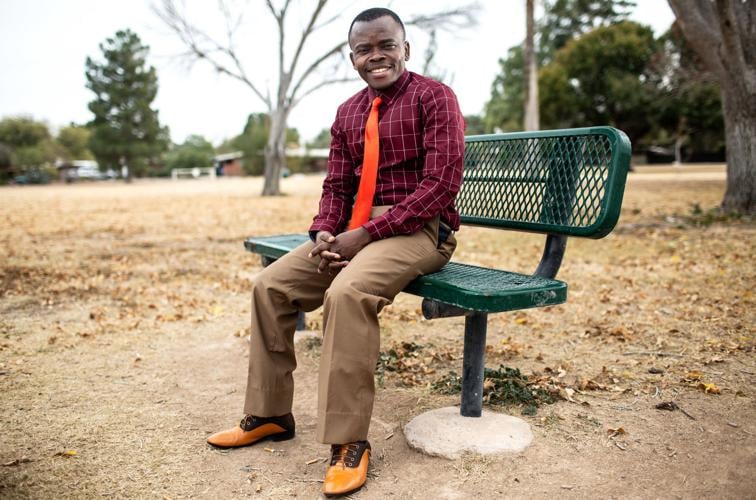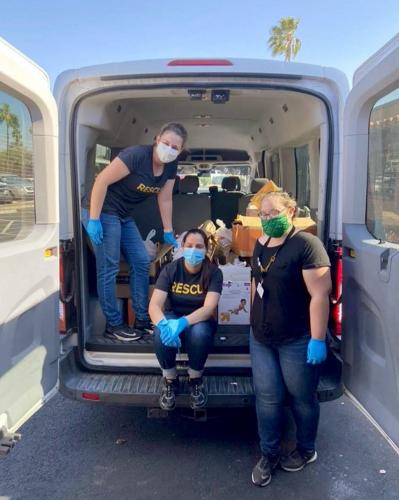For Manga Erasto Mfaume, leaving home was the beginning of a long journey ahead.
Mfaume and his family fled the Democratic Republic of Congo more than two decades ago in search of freedom and a safe place to call home. After spending 20 years in a refugee camp in Tanzania, where even basic necessities like food and medicine were limited, they were finally on their way to the United States.
On April 20, 2018, a date he remembers vividly, Mfaume resettled in Tucson with his wife and their five children. “We all like this place,” he said. “This is a peaceful country.”
There are nearly 26 million refugees globally, and refugees like Mfaume and his family make up less than 1% who are resettled each year, according to the United Nations High Commissioner for Refugees reports.
Teenage girls at a refugee camp in Jordan are turning LEGOs into robots.
Refugee resettlement differs from asylum, and those who are admitted are vetted extensively as part of a process that can take several years.
“People don’t come here because they decided they want to come to the United States; people come here because they cannot return to their country because it’s not safe to do so,” said Connie Phillips, president and CEO of Lutheran Social Services of the Southwest. “Refugee resettlement is something that enjoyed bipartisan support before the last few years. It’s been very successful. There’s been all kinds of economic studies that show it’s good for the U.S.”
The United States has historically been the largest nation for resettlement, according to International Rescue Committee community engagement coordinator Stanford Prescott. “That has actually allowed us to lead on this issue globally.”
But in recent years, U.S. resettlement numbers have dropped significantly. The Department of State’s Refugee Processing Center reported that in the 2020 fiscal year, which ended Sept. 30, 11,814 refugees were admitted. Largely due to the pandemic, numbers were well below the annual cap of 18,000 — an already historically low bar set by the Trump administration, which was further decreased to 15,000 for 2021.
As U.S. resettlement numbers have decreased, so have the global numbers, Prescott said. “Refugee resettlement is a diplomatic tool to help stabilize regions to help work with our partners in different parts of the globe. That has been, under the current administration, a tool that has not been used.”
President-elect Joe Biden has said he will increase that cap to 125,000. Arizona resettlement agencies expect that cap to climb over time, allowing them to readjust and prepare for more arrivals in the future.
Pandemic’s impact on local refugees
Nationally, Arizona is one of the highest states for resettlement, Prescott said. The IRC and Lutheran Social Services are among the organizations that provide a number of resources for newly arrived refugees, including job placement, enrolling children in school, finding and furnishing housing, and social services and community support.
“Refugees, under normal circumstances, are self-sufficient within six months,” Prescott of the IRC said. “About 84% of them have a job, they’re paying their bills and paying taxes. So, refugees are a key component of our local economy.”
These are not normal circumstances, however. The unique challenges resettled refugees face have been further exacerbated by the pandemic. To help refugees cope with these added complications, several refugee-serving agencies have redirected their resources.
“When the pandemic first came last spring, it really threw our refugee clients into quite a crisis,” said Phillips of Lutheran Social Services. “Between the community and the staff’s ability to be innovative and to pivot, I think we were successful in providing for basic needs and responding to the immediate crisis.”
Since many recently arrived refugees work in hard-hit industries such as hospitality, food service and transportation, they are among those greatly impacted by the pandemic, Prescott said.
More than 40% of the resettled refugees that Lutheran Social Services has assisted lost their jobs since the pandemic hit, Phillips said.
Arizona resettlement agencies addressed these issues by helping those who lost their jobs find new employment, as well as distributing food and supplies. They also supplied refugees with information about economic relief programs for which they might qualify, such as rent and utility assistance through the city of Tucson.
But more assistance presents its own challenges.
“The increase in requests for assistance have created challenges for resettlement agency staff in meeting the demand,” Brett Bezio, Arizona Department of Economic Security deputy press secretary, said in an email.
One of Lutheran Social Services’ solutions was to bring in an additional staff member to help with pandemic-specific outreach and education.
“They take care of their people,” Mfaume said about Lutheran Social Services, which has worked with him and his family during their resettlement. He said the agency gave his family food, socks, shoes and other supplies since the pandemic hit, and the agency regularly calls to check in.
Safety and testing initiatives
The pandemic has revealed factors that contribute to greater positive rates among low-income communities, communities of color and immigrants — many of which apply to refugees. The nature of their work in essential industries coupled with living situations in which multiple generations reside in one home makes them more at risk, Prescott said.
To counter this, agencies have implemented measures to improve safety and testing in refugee communities.
Thanks to a grant from the Arizona Department of Health Services, the Pima County Health Department and the IRC have partnered to establish free local testing sites and ensure information about these sites is shared with the city’s refugees, Prescott said.
“This testing program is so important because if we can make sure that the most vulnerable people have access to testing, then we can keep those rates lower, which helps the community.”
In addition, Lutheran Social Services’ Refugee Women’s Empowerment Program and church group volunteers made masks, which were distributed to refugees along with cleaning supplies and hand sanitizer.
Communication between refugee-serving organizations and refugees has been increasingly important during the pandemic.
“It was a little difficult sometimes to help them see how this unseen threat was something they needed to really be careful about,” Phillips said. “People who have experienced trauma can sometimes see things differently than those of us who have not.”
Since they had already developed relationships with local refugee communities, the agencies became a trusted source for information. They created, translated and disseminated informational COVID-19 materials through various platforms, including WhatsApp, phone calls, websites and videos.
The DES joined the Refugee and Immigrant Service Providers Network to create multilingual COVID-19 resources as well as Valleywise Health Medical Center in Phoenix to produce multilingual videos, said Bezio.
Strategies for Continued Education
The switch to remote learning created a range of barriers for refugee families, from access to digital literacy. And for many parents like Mfaume, it is a struggle to juggle work and helping children with online school.
Tucson schools have jumped in, providing essential equipment to refugee youth. Local resettlement agencies also work with families to help them navigate digital education.
“Now that we have most of our refugees working again, which has helped tremendously because then they have an income, the focus now has really been on working with the youth about how to manage virtual school,” Phillips said.
The organization also has two staff members dedicated to school mentorship programs.
Tucson has “a heart of support for refugees,” which has gone a long way in supporting them during the pandemic, Phillips said. She believes the systems the agency and the community put in place have been effective and they are in a good place moving forward.
“Our city partners, our state partners, the philanthropic community — everyone really rallied,” Phillips said.
That community support is part of what Mfaume said he enjoys about living here.
“I like Tucson because the people, the community of Tucson is good. We live together like friends, like brothers.”
Since arriving in Tucson, Mfaume has learned English, his fifth language, and works as a certified nursing assistant. He and his wife welcomed their sixth child in 2019.
He now has his sights on the next chapter. Mfaume dreams of becoming a registered nurse when the pandemic subsides so he can continue to support others, just as he believes the community here has done for him and his family.
“I need to help people. That is my passion.”
Photos for May 29: Tucson gets by during Coronavirus Pandemic
Tucson gets by during coronavirus pandemic
Updated
The iconic Casa Molina bull and matador statue both sport masks on the first full week of the loosening of COVID19 restrictions, May 23, 2020, Tucson, Ariz. The bull previously had a mask on the testicles.
Tucson gets by during coronavirus pandemic
Updated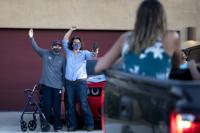
Michelle Leon Cordova, right, mother, and her son Sahuarita High School senior Lino Cordova, whom is fighting cancer, wave at staff members from Diamonds Children Center, friends and the Marana Police Department during a car parade, celebrating Lino's graduation, outside of his home on May 13, 2020 in Sahuarita, Ariz. Cordova stood on the sidewalk while the team from Diamond Children Center, friends and the Marana police department gave Cordova a graduation gar parade. Cordova was given a gift basket with his favorite snacks, gift cards as well as other items he enjoys. The car parade, also, celebrated another graduating senior fighting cancer from Empire High School, Noah Nieto. Nieto, also, received a gift basket with snacks, gift cards and other items Lino enjoys.
Tucson gets by during coronavirus pandemic
Updated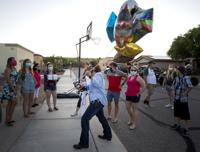
Michelle Leon Cordova, right, mother, brings celebration balloons to a car after staff members from Diamonds Children Center, friends and the Marana Police Department celebrate Sahuarita High School senior Lino Cordova, whom is fighting cancer, graduation with a car parade outside of his home on May 13, 2020 in Sahuarita, Ariz. Cordova stood on the sidewalk while the team from Diamond Children Center, friends and the Marana police department gave Cordova a graduation gar parade. Cordova was given a gift basket with his favorite snacks, gift cards as well as other items he enjoys. The car parade, also, celebrated another graduating senior fighting cancer from Empire High School, Noah Nieto. Nieto, also, received a gift basket with snacks, gift cards and other items Lino enjoys.
Tucson gets by during coronavirus pandemic
Updated
Personnel from Tucson Medical Center line the heliport to watch A-10's from Davis-Monthan Air Force Base's 355th Wing and F-16's from the Arizona Air National Guard's 162nd Wing make a pass over the facility, one leg of an area wide community flyover, May 14, 2020, Tucson, Ariz.
Tucson gets by during coronavirus pandemic
Updated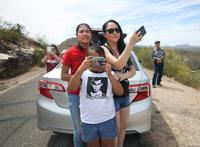
Nancy Celix-Campos, right, a respitory therapist at Tucson Medical Center, watches the military flyover with her daughters, Giana, 12, and Jazmyn, 8, from Sentinel Peak on May 14, 2020. Two F-16 Fighting Falcons from Arizona Air National GuardÕs 162nd Wing and two A-10 Thunderbolt II's from the 355th Wing, assigned to Davis-Monthan Air Force Base, fly over Tucson area hospitals to honor healthcare personnel and first responders as they are some of the frontline workers dealing with the coronavirus disease (COVID-19) head on. "It's been an exhausting two to three months," says Campos, "it's pretty cool, I like how they're going by each hospital."
Tucson gets by during coronavirus pandemic
Updated
Two F-16 Fighting Falcons from Arizona Air National Guard’s 162nd Wing and two A-10 Thunderbolt II's from the 355th Wing, assigned to Davis-Monthan Air Force Base, fly over Northwest Medical Center north of Tucson on May 14, 2020.
Tucson gets by during coronavirus pandemic
Updated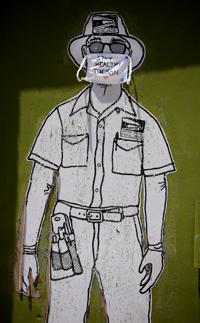
A letter carrier portrait on the Ok Market building, located in the Armory Park neighborhood, is adorned with a face mask on May 18, 2020.
Tucson gets by during coronavirus pandemic
Updated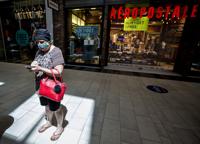
Rosemary Garcia waits for a family member outside of a store at Park Place Mall, 5870 E. Broadway Blvd., in Tucson, Ariz. on May 19, 2020. Malls reopened today under CDC guidelines and Gov. Ducey's new rules for businesses due to the Coronavirus pandemic. Park Place Mall has signs throughout the mall reminding customers to keep a six feet distance as well as hand sanitizer stations near each entrance. About half of the tables in the food court have been removed to allow for social distances as well as less than half of the stores have opened with new guidelines. Of the stores open, only 10 customers are allowed to shop in each store at a time.
Tucson gets by during coronavirus pandemic
Updated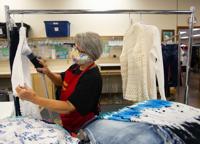
Pat Schlote steams clothing before it is put on the sales floor at the Golden Goose Thrift Shop in Catalina, Ariz., on May 21, 2020.
Tucson gets by during coronavirus pandemic
Updated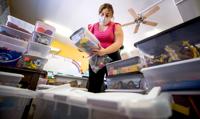
Ada Contreras, teaching assistant, looks through containers while reorganizing toys at Herencia Guadalupana Lab School, 6740 S. in Tucson, Ariz. on May 21, 2020. As Child care centers begin to re-open when they are ready, Herencia Guadalupana Lab School is reorganizing and cleaning everything in the facility before re-opening on June 2. To allow for social distancing and decrease the amount of items children touch, Herencia Guadalupana Lab School has sheds where items will go as well as placing items in containers organized by category.
Tucson gets by during coronavirus pandemic
Updated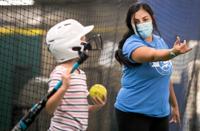
Jen Martinez, right, softball coach, teaches Skylar Reilly about hitting during a session at Centerfield Baseball Academy, 5120 S. Julian Dr., in Tucson, Ariz. on May 21, 2020. After re-opening on Monday, Centerfield Baseball Academy has implemented new policies in response to the Coronavirus Pandemic such as wearing masks, cleaning, signage, hand sanitizer and limiting the amount of people inside the facility.
Tucson gets by during coronavirus pandemic
Updated
Karl Bosma, left, and George Cantua, with facilities and maintenance, lay down stickers to mark six-foot separation distance around one of the baggage carousels, part of the efforts at Tucson International Airport to work within the restrictions of COVID19, May 22, 2020, Tucson, Ariz.
Tucson gets by during coronavirus pandemic
Updated
A lone passenger waits for a flight near one of the shuttered restaurants in the B Gates before Memorial Day at Tucson International Airport on May 22, 2020.
Tucson gets by during coronavirus pandemic
Updated
Drew Cooper on the stage in the St. Philip's Plaza courtyard, May 22, 2020, Tucson, Ariz., where live music is back on the schedule.
Tucson gets by during coronavirus pandemic
Updated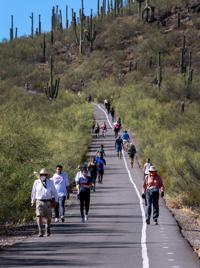
Many people visit Tumamoc Hill during the first day of Tumamoc's re-opening in Tucson, Ariz. on May 25, 2020. After being closed due to the Coronavirus pandemic, Tumamoc Hill re-opened with some modifications. There are hand sanitizer stations throughout the hike to the top as well as arrows, spaced 10-ft apart, lined up and down the hill. Some runners, hikers and walkers are also wearing masks during their hike. "The steps we are taking aim to provide our community with needed exercise, connection to our beautiful desert and a sense of comfort in such a trying time, while balancing the fact that gathering as a community endangers each of us and our loved ones. This is an unprecedented challenge that we are taking extremely seriously," said Benjamin T. Wilder, director of Tumamoc Hill. Visitors are also asked to limit their group to three people and to not touch the gate at the top of the hill- a tradition for some who make it to the top. "This is a time when we need to establish new traditions and adapt in a creative manner that embraces empathy, unity, care and patience," Wilder said.
Tucson gets by during coronavirus pandemic
Updated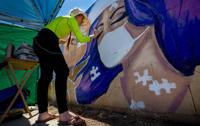
Pen Macias, artist, works on part 2 of a mural for a client on E. Broadway Rd., between S. Columbus Blvd. and S. Alvernon Way, in Tucson, Ariz. on May 25, 2020. Macias, known as The Desert Pen, has been working on her clients mural for the past three months. "It's the one thing I love, I have a passion for and the only thing I could be happy doing," said Macias. The mural represents her client, a single mother of four who works in the health care field. One half of the mural is dedicated to the connection between mothers and their children. The other half is dedicated to the connection between nurses and patients. The client wanted some positivity in the mural to show how nurses give a piece of themselves to their patients hence the puzzle pieces in the nurse and the patients, said Macias.
Tucson gets by during coronavirus pandemic
Updated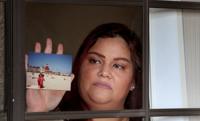
Christina Cortinas, posing at her home, May 28, 2020, Tucson, Ariz., with a photo of her and her mother, Catherine Rodriguez, in San Diego, 1991. Rodriguez is currently in assisted living and fighting COVID19. Cortinas hasn't seen her mother in months, the longest such span in her life.
Tucson gets by during coronavirus pandemic
Updated
Ruben Lopez looks through handouts while attending a Eviction Resource Fair with his family outside the Pima County Justice Court.


